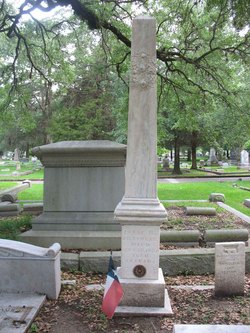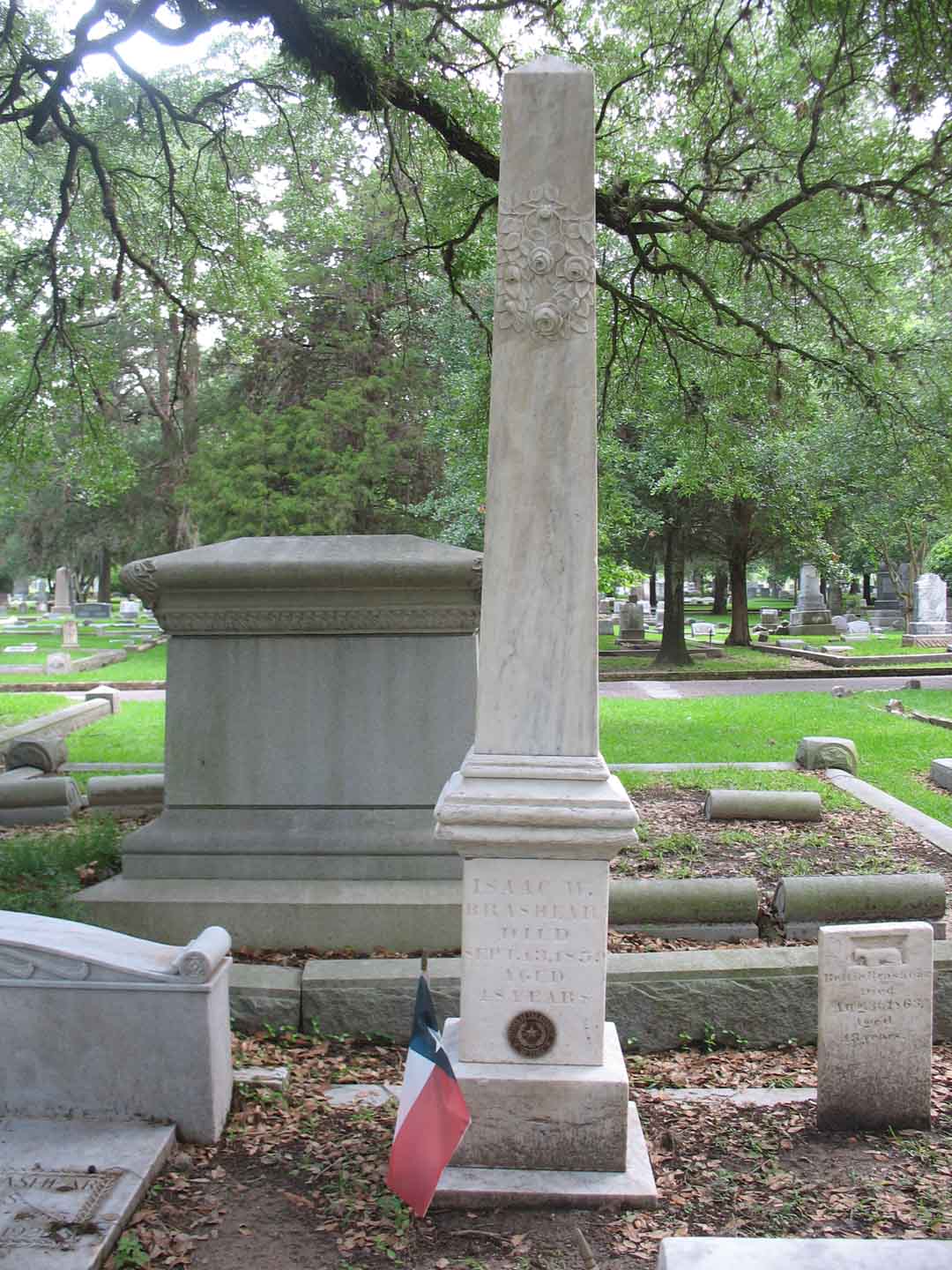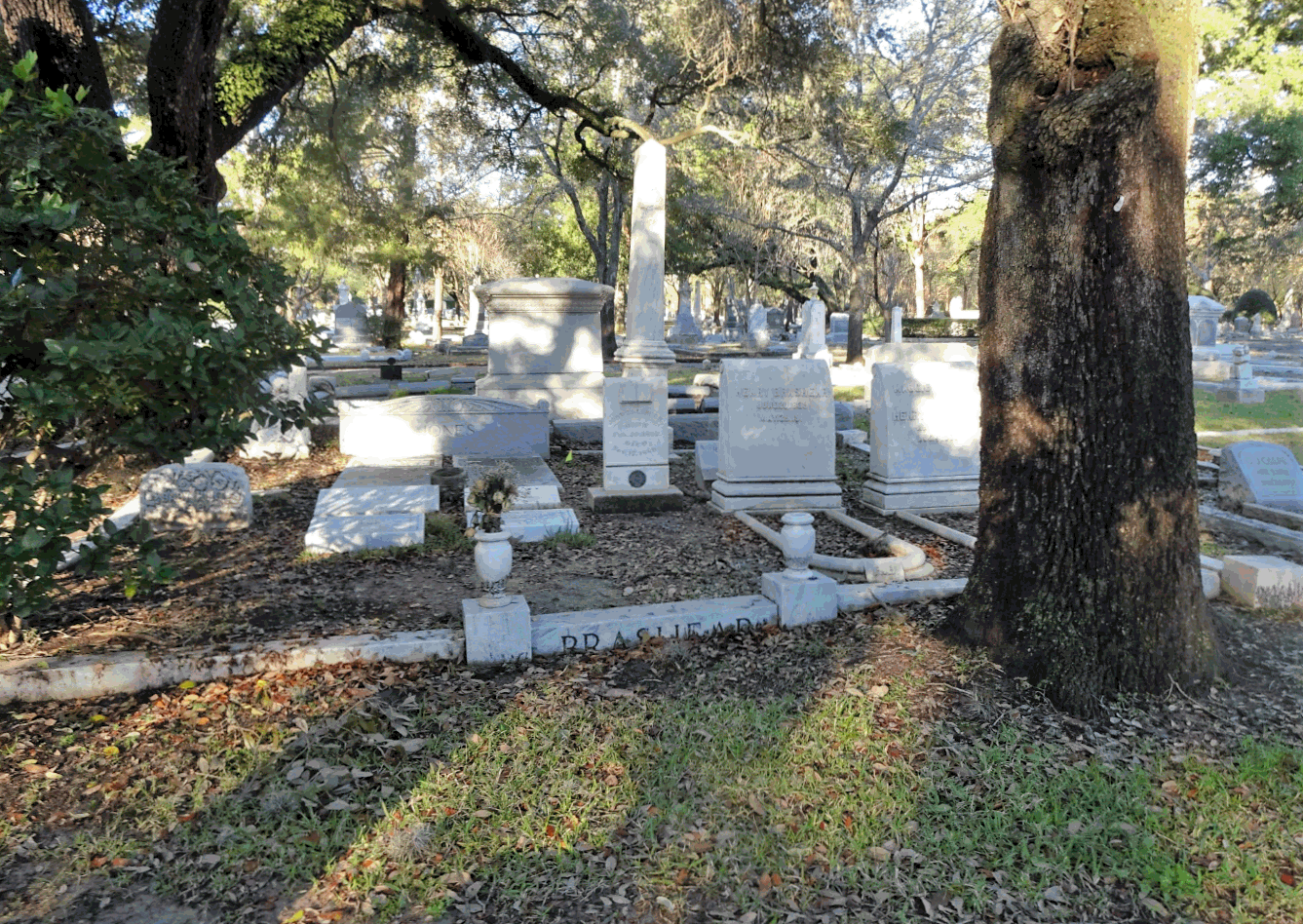1845 Convention
Delegate from Harris County
1846 1st Legislature,
Senator from Harris County
1849-50 3rd Legislature
Senator from Harris county
~
BRASHEAR, Hon. ISAAC WRIGHT
Hon. Isaac Wright Brashear, for many years a resident of Houston, being one of the early settlers of this city, was a native of Guilford county, North Carolina, where he was born in the year 1811. His parents, who were also natives of North Carolina, moved from that State about the year 1815, to middle Tennessee and settled in Rutherford county. In this county Isaac W. was reared. His early lot was by no means an easy one, for his father died when Isaac W. was as yet a child, and the family being left in straitened circumstances, he was early thrown on his own resources. He began the serious duties of life for himself at the age of twelve, finding a home among the farmers of Rutherford county, for whom he worked during the spring and summer months, and received the privileges of the local schools in winter. He thus acquired the elements of a common English education, and formed the useful habits of industry and self-reliance. February 13, 1833, he married Sarah Trott, a native of Rutherford county, and settled on a farm, which he carried on with only moderate success for about six years. In 1839 he moved to Te.xas in company with his father-in-law, Henry Trott, who had previously visited the country and selected a location in the vicinity of Houston. Here Messrs. Trott and Brashear purchased a large tract of land, being that now included in the suburbs of Chaneyville and Houston Heights, on which they settled and engaged in farming. Subsequently Mr. Brashear moved into the city of Houston and embarked extensively in land speculation. He was a man of energetic nature and sound business ideas, and he soon acquired prominence, and laid the foundation for what has since proved to be a very large estate. He was a member of the Constitutional convention of 1845, serving with the late Alexander McGowen, from Harris county. He advocated, in that body, the insertion in the organic law of the State of a liberal provision on homesteads and personal property exemptions, and the setting apart of a reasonable share of the public domain for school purposes. It is to the credit of Harris county that both her representatives contended sturdily for these measures, and that it was largely through their efforts and influence that the success of each was attained. In 1852 he was elected to the State Senate from his Senatorial district, becoming a candidate chiefly on account of his friendship for General Houston, who, it was known, would be a candidate at the ensuing session of the Legislature for the United States Senate, and whom he wished to support for that position. He was actively engaged in business pursuits, and to some extent in politics, up to his death, which occurred September 13, 1859. He died in the prime of life, and at a time when his career gave promise of much usefulness and success, but not, however, until he had left in distinct outline the imprint of his character and talents upon the life and condition of the people among whom he spent the last twenty years of his life. It would probably not subserve any useful purpose to speculate now as to how a man of the gifts and standing of Isaac Wright Brashear would have conducted himself in the great civil commotion of 1861-5, nor what part he would have played in the era of industrial development following that period, but speaking from the later achievements of others, with whose success his own compared most favorably at the time of his death, it may safely be said that, had he been spared, he would not only be numbered among the pioneers of this locality, but would rank as one of the builders of the commonwealth. Opportunity has much to do with achievement, and opportunity is what was denied many of Texas' most talented men.
Mr. Brashear left surviving him a widow and five children. His widow is still living, being now in her seventy-eighth year, and one of the oldest settlers in Houston. The children who became grown were two sons, John and Henry, and two daughters, Annexa and Sallie; one daughter, Bettie, dying at the age of fourteen, John Brashear, born in Rutherford county, Tennessee, February 20, 1837, was reared in Houston; filled a number of public positions here, including those of County Clerk and Chief Justice of the county; served in the Confederate army during the late war, and practiced law up to the time of his death, November 17, 1886. Henry Brashear, the second son, resides in Houston; has been County Judge of Harris county, Clerk of the District Court of the same; is vice-president of the South Texas National Bank, and otherwise prominently connected with the political, business and social life of the city. The daughters are both married, the former being the wife of Charles Miller, a farmer of Harris county, and the latter the wife of Colonel J.W. Jones, of the Houston bar. The descendants of Isaac Wright Brashear now number between twenty and twenty-five, and all are worthy of the name they bear, and without exception are filling useful and honorable places in society. (Source: History of Texas Biographical History of the Cities of Houston and Galveston (1895)
1845 Convention
Delegate from Harris County
1846 1st Legislature,
Senator from Harris County
1849-50 3rd Legislature
Senator from Harris county
~
BRASHEAR, Hon. ISAAC WRIGHT
Hon. Isaac Wright Brashear, for many years a resident of Houston, being one of the early settlers of this city, was a native of Guilford county, North Carolina, where he was born in the year 1811. His parents, who were also natives of North Carolina, moved from that State about the year 1815, to middle Tennessee and settled in Rutherford county. In this county Isaac W. was reared. His early lot was by no means an easy one, for his father died when Isaac W. was as yet a child, and the family being left in straitened circumstances, he was early thrown on his own resources. He began the serious duties of life for himself at the age of twelve, finding a home among the farmers of Rutherford county, for whom he worked during the spring and summer months, and received the privileges of the local schools in winter. He thus acquired the elements of a common English education, and formed the useful habits of industry and self-reliance. February 13, 1833, he married Sarah Trott, a native of Rutherford county, and settled on a farm, which he carried on with only moderate success for about six years. In 1839 he moved to Te.xas in company with his father-in-law, Henry Trott, who had previously visited the country and selected a location in the vicinity of Houston. Here Messrs. Trott and Brashear purchased a large tract of land, being that now included in the suburbs of Chaneyville and Houston Heights, on which they settled and engaged in farming. Subsequently Mr. Brashear moved into the city of Houston and embarked extensively in land speculation. He was a man of energetic nature and sound business ideas, and he soon acquired prominence, and laid the foundation for what has since proved to be a very large estate. He was a member of the Constitutional convention of 1845, serving with the late Alexander McGowen, from Harris county. He advocated, in that body, the insertion in the organic law of the State of a liberal provision on homesteads and personal property exemptions, and the setting apart of a reasonable share of the public domain for school purposes. It is to the credit of Harris county that both her representatives contended sturdily for these measures, and that it was largely through their efforts and influence that the success of each was attained. In 1852 he was elected to the State Senate from his Senatorial district, becoming a candidate chiefly on account of his friendship for General Houston, who, it was known, would be a candidate at the ensuing session of the Legislature for the United States Senate, and whom he wished to support for that position. He was actively engaged in business pursuits, and to some extent in politics, up to his death, which occurred September 13, 1859. He died in the prime of life, and at a time when his career gave promise of much usefulness and success, but not, however, until he had left in distinct outline the imprint of his character and talents upon the life and condition of the people among whom he spent the last twenty years of his life. It would probably not subserve any useful purpose to speculate now as to how a man of the gifts and standing of Isaac Wright Brashear would have conducted himself in the great civil commotion of 1861-5, nor what part he would have played in the era of industrial development following that period, but speaking from the later achievements of others, with whose success his own compared most favorably at the time of his death, it may safely be said that, had he been spared, he would not only be numbered among the pioneers of this locality, but would rank as one of the builders of the commonwealth. Opportunity has much to do with achievement, and opportunity is what was denied many of Texas' most talented men.
Mr. Brashear left surviving him a widow and five children. His widow is still living, being now in her seventy-eighth year, and one of the oldest settlers in Houston. The children who became grown were two sons, John and Henry, and two daughters, Annexa and Sallie; one daughter, Bettie, dying at the age of fourteen, John Brashear, born in Rutherford county, Tennessee, February 20, 1837, was reared in Houston; filled a number of public positions here, including those of County Clerk and Chief Justice of the county; served in the Confederate army during the late war, and practiced law up to the time of his death, November 17, 1886. Henry Brashear, the second son, resides in Houston; has been County Judge of Harris county, Clerk of the District Court of the same; is vice-president of the South Texas National Bank, and otherwise prominently connected with the political, business and social life of the city. The daughters are both married, the former being the wife of Charles Miller, a farmer of Harris county, and the latter the wife of Colonel J.W. Jones, of the Houston bar. The descendants of Isaac Wright Brashear now number between twenty and twenty-five, and all are worthy of the name they bear, and without exception are filling useful and honorable places in society. (Source: History of Texas Biographical History of the Cities of Houston and Galveston (1895)
Family Members
Advertisement
Explore more
Sponsored by Ancestry
Advertisement










